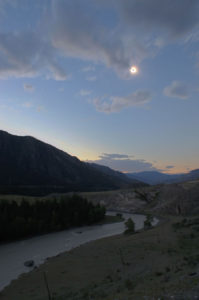Almost Here! The Great American Solar Eclipse

People tend to be afraid of the unknown. When faced with mysteries, people throughout history have felt compelled to make up stories to explain them. Whenever unexpected and mysterious things lay completely beyond human control, people have often explained these phenomena by attributing them to gods.
In February of 1504, Christopher Columbus was stranded, along with some of his crew, among a tribe of indigenous Arawak peoples of Cuba. These native peoples were taking care of the Europeans, feeding and sheltering them. In a despicable show of ingratitude, some of Columbus’s crew mutinied, killing several of the tribe. This was not endearing to the tribe, as you might well imagine. The European “guests” had overstayed their welcome, and even the ones who hadn’t perpetrated the violence were in mortal peril from the enraged tribe. Columbus responded by ordering his European (Christian) God to blot out the moon from the sky and replace it with a blood-red menacing orb as a sign of displeasure with the recalcitrant natives. The tribe, duly horrified and cowed, continued to care for and feed Columbus and his remaining crew until they could repair their ships and leave.
Columbus had used an astronomical almanac to predict the eclipse of February 29, 1504, and had used this knowledge as a weapon against his hosts—putting the fear of his God into them. A lunar eclipse happens whenever the earth moves in between the moon and the illuminating sun, causing a deep shadow to be cast over our natural satellite. This shadow bathes the moon in red light because the red light (but not blue or green) is bent and filtered by earth’s atmosphere, related to the phenomenon that causes red sunsets and sunrises.
Sometimes, the moon moves between the sun and the earth, though. This causes a solar eclipse. Sometimes, the moon completely blots out the sun, casting a shadow along a path traced out along the surface of the earth.
Records left by long-vanished civilizations make it clear that in ancient times solar eclipses were terrifying and ominous. The Babylonians were certain that a total solar eclipse portended the death of the king or other calamities. Surely, the reasoning went, the gods must be angry. People thousands of years and miles removed from each other drew the same conclusions about angry gods (albeit different gods) when experiencing what were, for them, unexplainable astronomical events.
Columbus had a distinct advantage though; he had science on his side. Unfortunately, he used it to intimidate and perform a sort of magic trick, but it is a stark example that knowledge of nature—real knowledge divorced from superstition, is empowering. It can help all of us confront our fears and approach the unknown with curiosity and study, rather than with fear and trembling before the gods.
The orbit of the moon and of the earth around the sun have been well-known and well-explained since Copernicus, Kepler, Galileo, and Newton. Yet even today, too many people exhibit profound ignorance about natural science. The pundit Bill O’Reilly, for example, once berated an atheist on his show by asking a question he clearly thought of as having no good answer: “Tide comes in, tide goes out. Can you explain that?!” Of course we can explain that. Newton could explain that 500 years ago. When confronted with this knowledge, O’Reilly asked a follow-up question: “How’s the moon get there? How come we have one?” There’s an answer to that, also. It’s great that he asked good questions, exhibiting a genuine curiosity. It’s sad that he never bothered to spend a couple of minutes exploring the science of the answers.
On Monday, August 21, 2017, an event billed as the Great American Solar Eclipse will occur. I hope you get to see it. If you’re by a window or outside, you can. Nearly every part of the United States will be able to see at least a partial eclipse, wherein the moving orb of the moon covers at least part of the sun. Please look safely though, with a pin-hole viewer, a projected image of the sun, or through specially made and certified solar-viewing glasses.
You may gasp when you see it. The author Annie Dillard reported that during a total eclipse she witnessed, people screamed. I suspect they were exhalations of wonder and amazement, and not of terror. Long gone are the days when we need to be terrified of comets, eclipses, novas, and other random goings-on in the sky.
